Question: I love to bake! Can you give me any gluten-free baking tips and pointers for this upcoming holiday season?
Answer: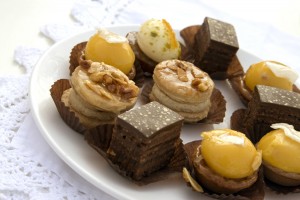
Baking with gluten-free ingredients can be both challenging… and fun! In order to make tasty and satisfying gluten-free baked products it is essential to learn how to use different types and combinations of flours, starches and other ingredients, as well as specific baking techniques in order to compensate for the lack of gluten. Here are a few general gluten-free baking tips:
General Gluten-free Baking Tips:
Store gluten-free flours and starches in plastic airtight containers with wide and tightly fitting lids; and for optimum freshness keep them in the refrigerator or freezer. Allow the cold flour or starch to return to room temperature before using.
• Mark It: Label containers with the name of the item and date purchased.
• Measure it once… and twice: Measure flours and starches carefully. Inaccurate measurements can greatly affect the quality of gluten-free recipes because each flour and starch has very unique properties.
• Keep it loose: Loosely spoon the flour or starch into the measuring cup, leveling the top with the flat side of a knife. Never pack down the flour.
• Cook with sparkle: Use shiny, light-colored metal pans (gray not black). Products bake and brown more evenly in lighter colored pans than in dark pans, which can leave edges crisp and over-browned.
• Keep it low: When using glass baking pans and non-stick metal baking pans [gray not black), reduce oven temperature by 25 degrees F.
• Longer is better: Most gluten-free breads are better when baked at lower temperatures for longer periods of time. After the first 10- 15 minutes of baking, tent the bread with foil to prevent over –browning.
• Lows and highs: Baking is also affected by temperature and altitude. Slightly reduce the amount of liquid in recipe if baking at a higher altitude or on a very humid day. For baking at very low altitudes, slightly increase the amount of liquid.
• That’s the way the (gluten-free) bread crumbles: Gluten-free bread dough tends to be softer, stickier and more batter-like. If it is too heavy and dry, the bread tends to be too crumbly.
• Dust it with sweetness: When making a gluten-free chocolate cake or brownies, grease the pan and then “flour” the pan with cocoa.
Texture Tips:
• Double it up: A combination of gluten-free flours and starches makes a better product than single flours.
• Leave it to leavening: Gluten-free baked products often require more leavening than products made with wheat due to the lack of gluten which is necessary to form an elastic dough and enables the product to rise.
• Crumbler fixers: It is important to use xanthan gum or guar gum in baked products in order to prevent crumbling. Add the gum to the dry ingredients as it does not mix with water. For every cup of gluten-free flour, use 1 teaspoon of gum for breads and ½-3/4 teaspoon for other baked goods.
• Gelatin to the rescue: Unflavored powdered gelatin also works as a binding agent and can prevent crumbling. If substituting gelatin for xanthan or guar gum, use twice as much gelatin. Soften the gelatin in half the water called for in the recipe before adding.
• (Butter)Milking it: Substituting buttermilk for the milk or water in recipes results in a lighter, more finely textured product. Carbonated beverages [not diet soft drinks) in place of water or milk can also result in a lighter-textured product (e.g., pancakes, cakes).
• Take the time: Let gluten-free dough sit at least 30 minutes at room temperature to soften. This results in a better-textured product
Flavor Tips:
• Spice it up: To improve the flavor of gluten-free baked products use more herbs, spices and flavorings (approximately 1/3 – ½ more than normal).
• Get cocoa, nutty & fruity too: Adding chocolate chips, nuts, fruits (e.g., applesauce, bananas) dried fruits (e.g., apricots, cranberries, raisins) can also improve the flavor.
• Hey Sweetie: Honey or molasses can provide more flavor than white sugar. You need to reduce the amount of liquid in the recipe if making this substitution. If a recipe calls for 1 cup of sugar, use 3/4 cup honey or molasses.
• Toast it: Most gluten-free breads taste better toasted or warm.
Storage Tips:
• Seal it: Baked products made with gluten-free flours have no preservatives, become stale quickly and are quite perishable. Wrap them tightly in plastic wrap and store in airtight plastic containers or self-seal plastic bags. If the product will not be eaten within one or two days, freeze to ensure minimum loss of moisture and flavor. For breads, it is best to thoroughly cool, slice and separate each slice with wax paper before bagging and freezing.
• Keep it moist: Placing baked products such as muffins in plastic bags when still warm can preserve moisture.
• Thaw Tips: Thaw frozen baked goods at room temperature instead of microwaving at full power; microwaving causes them to become rubbery and tough.
Note: Thanks to the following gluten-free culinary experts for some of the background information on gluten-free flours and starches, substitutions and many of the above baking tips:
Carol Fenster, PhD, President and Founder of Savory Palate, Inc., gluten-free publishing and consulting firm. Author of:
1000 Gluten-Free Recipes; Gluten-Free 101: Easy Basic Dishes without Wheat; Wheat-Free Recipes and Menus: Delicious, Healthful Eating for People with Food Sensitivities; Cooking Free: 220 Flavorful Recipes for People with Food Allergies and Multiple Food Sensitivities www.savorypalate.com
Connie Sarros, Author of gluten-free cookbooks and other resources:
Wheat-Free Gluten-Free Recipes for Special Diets; Wheat-Free Gluten-Free Cookbook for Kids and Busy Adults; Newly Diagnosed Survival Kit; Wheat-Free Gluten-Free Dessert Cookbook; Wheat-Free Gluten-Free Reduced Calorie Cookbook; All You Wanted to Know About Gluten-Free Cooking DVD
www.gfbooks.homestead.com
Donna Washburn, P.H.Ec. and Heather Butt, P.H.Ec., partners in Quality Professional Services, specializing in recipe development and bread machine baking. Authors of:
Complete Gluten-Free Cookbook; 125 Best Gluten-Free Recipes; The Best Gluten-Free Family Cookbook
www.bestbreadrecipes.com
Ask Shelley Case is a feature of BeFreeForMe.com. It is published the second Tuesday of each month. Shelley Case is a Registered Dietitian, Consulting Dietitian, Speaker and Author of Gluten-Free Diet: A Comprehensive Resource Guide. Visit Shelley and more glute-free tips at: www.glutenfreediet.ca

 om our entrepreneurial endeavors, labeling on food products, obstacle those with allergies need to overcome while on vacation and at restaurants, to the kindness and support those in the food allergy / celiac communities offer to each other. What struck me most however, was her positive attitude and optimistic approach for her mission to help others with food allergies.
om our entrepreneurial endeavors, labeling on food products, obstacle those with allergies need to overcome while on vacation and at restaurants, to the kindness and support those in the food allergy / celiac communities offer to each other. What struck me most however, was her positive attitude and optimistic approach for her mission to help others with food allergies.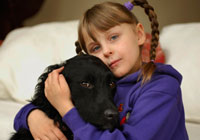
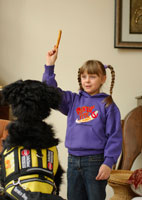 The Allergy Alert Dogs are trained to detect certain allergens, just like the dogs at the airports and borders that are trained to detect the scent of drugs and explosives. If a potentially dangerous scent is detected, the dogs will alert their owner to avoid contact or ingestion.
The Allergy Alert Dogs are trained to detect certain allergens, just like the dogs at the airports and borders that are trained to detect the scent of drugs and explosives. If a potentially dangerous scent is detected, the dogs will alert their owner to avoid contact or ingestion.
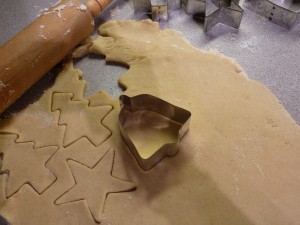 cookie cutters, cut out cookies and place on an ungreased cookie sheet about ½” apart from each other.
cookie cutters, cut out cookies and place on an ungreased cookie sheet about ½” apart from each other.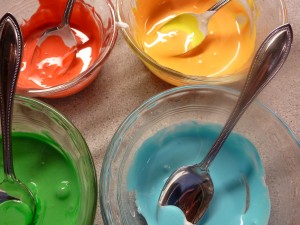 Place a bit of the icing in each bowl and mix in food coloring to make the desired colors for the cookies you are frosting. (Note: the more colors you mix up the more creative you will get!)
Place a bit of the icing in each bowl and mix in food coloring to make the desired colors for the cookies you are frosting. (Note: the more colors you mix up the more creative you will get!)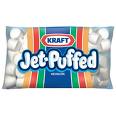 Making S’mores on hot summer nights, Congo Bars packed with care in my school time Road Runner lunchbox, and mini-marshmallows topping a steaming cup of hot chocolate after making snow men (and ladies!) with my two sisters many years ago on Cape Cod.
Making S’mores on hot summer nights, Congo Bars packed with care in my school time Road Runner lunchbox, and mini-marshmallows topping a steaming cup of hot chocolate after making snow men (and ladies!) with my two sisters many years ago on Cape Cod.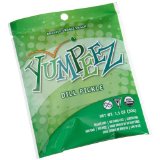 If snack-time is turning into nap-time due to the same old boring gluten and allergen-free snacks that you eat day-in and day-out, you need to try
If snack-time is turning into nap-time due to the same old boring gluten and allergen-free snacks that you eat day-in and day-out, you need to try  all of
all of  The holiday season brings about many traditions. One of the most memorable childhood memories for me is enjoying the sweet sticky treat of a candy cane.
The holiday season brings about many traditions. One of the most memorable childhood memories for me is enjoying the sweet sticky treat of a candy cane.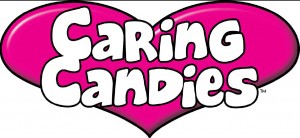 This company does it all… they make the traditional cane canes, candy drops (or
This company does it all… they make the traditional cane canes, candy drops (or 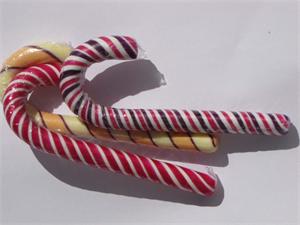

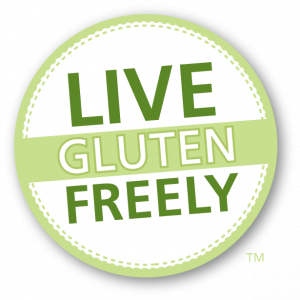 er service line been closed and your questions have been left unanswered?
er service line been closed and your questions have been left unanswered?